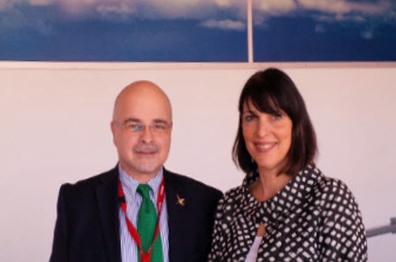Easyjet First Airline To Join Dementia Friends Initiative
- Written by George Sensalis
 Easyjet is the first UK airline to join the Dementia Friends initiative, a scheme set up by Public Health England and the Alzheimer’s Society.
Easyjet is the first UK airline to join the Dementia Friends initiative, a scheme set up by Public Health England and the Alzheimer’s Society.
Easyjet, the UK’s largest airline, sets the new benchmark in access to air travel for passengers with special needs by joining the Dementia Friends initiative.
Carolyn McCall, easyjet CEO, has taken the initiative on the advice of esaag, the Easyjet Special Assistance Advisory Group which includes Reduced Mobility Rights and Age UK among its members.
In 2013, esaag Chair David Blunkett MP tasked Roberto Castiglioni of Reduced Mobility Rights and Mervyn Kohler of Age UK to research the impact of dementia on air travel. The group’s ground breaking report was presented at the quarterly meeting of esaag in March 2014.
“Reduced Mobility Rights has been at the forefront of research on the impact of dementia and invisible disabilities on air travel,” Roberto Castiglioni said. “We are absolutely delighted with Mrs McCall’s decision since immediate action on invisible disabilities is of the essence as the window of opportunity for managing future challenges before they morph into emergencies is rapidly closing.”
The Dementia Friends scheme is giving people an understanding of dementia and the small things that they can do that could make a difference to people living with dementia.
Everyone in the air travel industry has a role to play in helping people with Alzheimer's. From the person at the check-in desk to cabin crew, people working throughout the aviation industry need to commit to learning more about dementia.
Easyjet plans to create a specific training protocol for all staff to raise personal awareness and ensure cabin crew can provide adequate support to passengers with Alzheimer’s and other invisible disabilities.
The airline’s first action was to update information available to passengers and carers on the easyjet.com website.
On its website, the airline reminds that it is very important to think about all aspects of the journey, including finding  your way through the airport and all the procedures such as security, which can be confusing and stressful. People with conditions such as dementia (including Alzheimer’s disease) are particularly at risk in the busy surroundings of a big airport and it is highly advisable they travel with a companion.
your way through the airport and all the procedures such as security, which can be confusing and stressful. People with conditions such as dementia (including Alzheimer’s disease) are particularly at risk in the busy surroundings of a big airport and it is highly advisable they travel with a companion.
People with learning or cognitive disability travelling alone should book assistance no later than 48 hours (2 days) in advance. Assistance is available at both the airport of departure and the airport of arrival, including baggage retrieval.
Easyjet also highlights that cabin crew should be made are aware of the needs of any passenger with a learning or cognitive disability so they can provide additional information or assistance.










